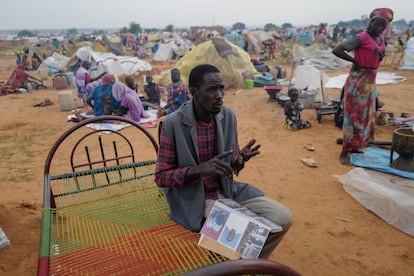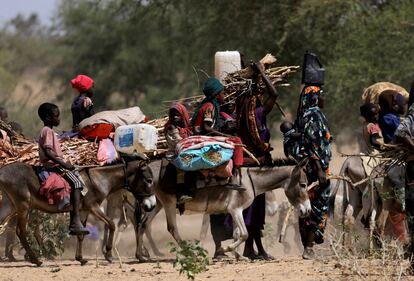Evidence of renewed ethnic cleansing in Sudan looms over Darfur
The war in the African country has acquired its own dimension in the western region, where local testimonies and experts warn that violence against the civilian population could constitute genocide

When war broke out in Sudan in April 2023 between the regular army and the powerful Rapid Support Forces (RSF) paramilitary group, initially in the capital Khartoum, one of the greatest fears was that the fighting would spread to the hard-hit land of Darfur. This vast region in the west of the country is the fiefdom of the RSF and is marked by deep-rooted ethnic tensions, so there were fears that the conflict would take on a dimension of its own.
Those omens were soon fulfilled and the advances of the RSF in the region have been accompanied by numerous atrocities. Violence against civilians in Sudan is widespread, but in Darfur it takes on a markedly ethnic character against local non-Arab communities, with the intention of wiping them off the map in campaigns that more and more observers and human rights organizations believe could amount to genocide.
The atrocity of the crimes in Darfur are alarming given the recent history of the region. They come two decades after former President Omar al-Bashir launched a devastating counterinsurgency campaign there against armed movements of non-Arab communities rising up against his policies of marginalization and plunder. Al-Bashir’s regime exploited local tensions arising from the growing competition between non-Arab farming communities and Arab pastoralist communities for increasingly scarce natural resources.
Many considered that Al-Bashir’s offensive led resulted in the ethnic cleansing of non-Arab communities, mainly Massalit, Fur and Zaghawa. Hundreds of thousands of people were killed, a scorched earth policy was applied against entire villages and large tracts of land, vast territories were forcibly depopulated, and sexual violence against women and girls was used systematically. Part of the militias to which the state delegated the campaign were institutionalized years later as the Rapid Support Forces.
Massacre in Geneina
The largest atrocities so far have been perpetrated in the capital of West Darfur, Geneina, which is mostly populated by the Massalit community. Between late April and early November 2023, the RSF and allied militias carried out a campaign of ethnic cleansing according to a report released Thursday by Human Rights Watch.
The massacres in Geneina were in some ways the chronicle of a tragedy foretold. The convulsive period that began in Sudan in 2019 with the fall of Al-Bashir, attempts to redefine Darfur’s political and security architecture, and the withdrawal of United Nations and African Union peacekeepers led to great instability and left Geneina, which suffered three large-scale attacks in just three years, dangerously exposed. “Between 2019 and now [there have been] numerous major attacks on the same Massalit civilian population, and in none of these cases has there been any accountability,” notes Mohamed Osman, one of the authors of the HRW report. “It is carried out by the same groups, the Rapid Support Forces and allied militias, [and] there is no accountability, no real investigations, and no prioritization of civilian protection.”
Just 10 days after clashes broke out between the army and the Rapid Support Forces in Khartoum in April 2023, the two engaged in brief fighting in Geneina. And what followed was two months of systematic attacks and looting by paramilitaries and allied militias in Massalit-majority neighborhoods and internally displaced people (IDP) centers. The situation deteriorated seriously on June 14, when the Massalit self-defense groups collapsed and the governor of West Darfur, Jamis Abbakar, was arrested and killed. A first mass exodus then took place in two directions: toward Chad and to Ardamata, a northern suburb of Geneina that hosts a garrison of the regular Sudanese Armed Forces. From dawn the following day, the paramilitaries and their allied militias set about expelling, house by house, those who had stayed behind. They also ambushed those who fled, who were subjected to widespread beatings, executions, and extortion, according to HRW’s exhaustive report. The escape roads were strewn with corpses.
In early November the final blow came. The RSF and their allies stormed Ardamata. Survivors told HRW that they again opened fire on fleeing civilians, executed people in their homes, detained hundreds, including children, carried out mass looting and set fire to residential areas. The RSF, which recruits mostly from Arab communities in Darfur, were central to all these attacks and the abuses that accompanied them, and the HRW report notes that Arab tribal militias apparently provided the majority of men. Another armed group of unclear origins, but allied with the paramilitaries, was also involved and some witnesses claimed to have seen foreign fighters in their ranks. Opposing them were Massalit self-defense groups and an armed movement led by Abbakar - the Sudanese Alliance - which were much smaller and less well-armed, and thus unable to stop the coup. The army and police failed to intervene.
The string of atrocities in the campaign against Geneina was harrowing: widespread killings in houses, streets and checkpoints, the use of explosives in densely populated areas, targeted killings of prominent members of the community, rape, torture, and arbitrary arrests.
The paramilitaries also deliberately looted, vandalized and burned down Massalit neighborhoods, attacked clinics and medical personnel, markets, critical infrastructure, and prevented community members from accessing places of refuge, food, and water, in an apparent attempt to severely undermine their ability to one day return, HRW concludes. A United Nations panel of experts asserted that the assaults were planned and coordinated, according to a document leaked in December, which estimated the number of people killed at between 10,000 and 15,000 according to intelligence sources. HRW also documented significant coordination between the attacking forces in and around Geneina.

Scorched earth
Although Geneina suffered the largest campaign of atrocities in Darfur, it was not the only place targeted. Numerous other non-Arab majority towns, particularly in West Darfur, have suffered similar assaults. Between April and July 2023 alone, paramilitaries and their allies attacked and burned at least seven villages in the region, according to HRW. The best documented case is the town of Misterei, from which the army withdrew in April, leaving it vulnerable to a possible attack. This came the following month, when the RSF and allied militias stormed the town in SUVs, on motorcycles, on horseback and on foot. They killed about 100 Massalits, shot those trying to flee, and looted and burned hundreds of homes, according to a report by the Raoul Wallenberg Centre of Human Rights and Humanitarian Law.
In North Darfur, a stronghold of non-Arab armed movements, similar massacres have also occurred. Last June, paramilitaries and allied militias stormed Kutum, a town 120 kilometers from the provincial capital, El Fasher, killing more than 40 people and wounding dozens, according to the Raoul Wallenberg Centre, which has documented a similar attack in at least one town with a majority Fur population. This report, which was endorsed by some 30 experts, concludes that the atrocities carried out by the Rapid Support Forces and allied militias in West Darfur are intended to destroy the Massalit community in whole or in part, and thus constitute a case of ongoing genocide. The institute also believes there is reason to believe that these forces are committing genocide against other non-Arab groups.
The United Nations special adviser on the prevention of genocide, Alice Wairimu Nderitu, stated in November that several of the attacks in Darfur “could constitute acts of genocide.” Soon after, the United States determined that the situation has “disturbing echoes of the genocide that began nearly 20 years ago in Darfur.” The prosecutor of the International Criminal Court, Karim Khan, announced as early as July 2023 that his office is investigating crimes in West Darfur.
All these precedents mean that the worst is now feared in North Darfur. In April, the RSF launched a major offensive in the state and is now preparing to attack El Fasher, one of Sudan’s most populous cities and a haven for hundreds of thousands of displaced people. Its population is mostly from non-Arab ethnic communities that form the bulk of many local armed groups, so an assault could trigger one of the most destructive battles of the war.
“Geneina highlights the brutality of the Rapid Support Forces against the non-Arab civilian population,” Osman warns. “But at the same time, the international community failed to respond and now we see a massacre unfolding, or possibly unfolding, in El Fasher. We are seeing strong messages from international leaders and actors not to attack, but civilians are still in danger,” he adds, which is why the humanitarian expert believes it is time to start considering the deployment of a civilian protection mission.
Sign up for our weekly newsletter to get more English-language news coverage from EL PAÍS USA Edition
Tu suscripción se está usando en otro dispositivo
¿Quieres añadir otro usuario a tu suscripción?
Si continúas leyendo en este dispositivo, no se podrá leer en el otro.
FlechaTu suscripción se está usando en otro dispositivo y solo puedes acceder a EL PAÍS desde un dispositivo a la vez.
Si quieres compartir tu cuenta, cambia tu suscripción a la modalidad Premium, así podrás añadir otro usuario. Cada uno accederá con su propia cuenta de email, lo que os permitirá personalizar vuestra experiencia en EL PAÍS.
¿Tienes una suscripción de empresa? Accede aquí para contratar más cuentas.
En el caso de no saber quién está usando tu cuenta, te recomendamos cambiar tu contraseña aquí.
Si decides continuar compartiendo tu cuenta, este mensaje se mostrará en tu dispositivo y en el de la otra persona que está usando tu cuenta de forma indefinida, afectando a tu experiencia de lectura. Puedes consultar aquí los términos y condiciones de la suscripción digital.









































